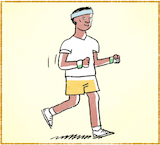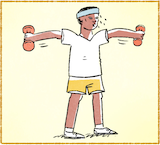


เขากำลังเฮ็ดหญัง เขากำลังออกกำลังกาย เขากำลังแล่นออกกำลังกาย
เขาแล่นอยู่จักคน เขาแล่นอยู่พุเดียว
แล้วเขาแล่นออกกำลังกายเฮ็ดหญัง เขากะอาดว่า อยากสิมีล้างกายแข็งแลง เขากะเลยสิแล่นออกกำลังกาย
แล้วเขาแล่นออกกำลังกายจั่งใด เขากะแล่นไปเลี้ยยๆ ปะสาแล่นออกกำลังซื่อๆ มันกะได้กำลังมาแล้ว กะสิเฮ็ดให้เฮาสุกขะพาบล้างกายแข็งแลง
7
เขากำลังเฮ็ดหญัง เขากำลังหว้ายน้ำ
เขาหว้ายน้ำเฮ็ดหญัง เขากะอาดสิฮ้อน หลืออาดสิอยากเหล้นน้ำ เขากะเลยมาหว้ายน้ำอยู่หนี้
แล้วเขาหว้ายน้ำอยู่ใส อาดสิหว้ายอยู่ในสะน้ำกะได้ อาดสิหว้ายอยู่ในทะเลกะได้ แล้วแต่เขาสิหว้ายอยู่ใส
8
เขากำลังเฮ็ดหญัง เขากำลังออกกำลังกายคือกัน เขากำลังออกกำลังกาย
เขาออกกำลังกายจั่งใด เขากะญกแนวญก
อันนี้มันเป็นแนวญก มีแนวญกฝั่งซ้าย กับ[แนวญก]ฝั่งขวา เขาใซ้มือสองข้างของเขาญกแนวญกขึ้นมา แล้วกะญกขึ้นญกลง
เพาะว่าเขาสิออกกำลังกาย เคี่ยงญกอันนี้ หลือว่าแนวญกอันนี้ มันเฮ็ดให้เฮามีกำลังมือกำลังแขนได้
Link to overview page
Link to dictionary
| Isaan | Pronunciation | Tones | Thai | English/Notes |
|---|---|---|---|---|
| เขา | khao | M | เขา | personal pronoun: he, she |
| กำลัง | gam-laŋ | M-HR | กำลัง | auxiliary indicating continuous or progressive action |
| เฮ็ด | het | H | ทำ | to do, to make |
| หญัง | ɲaŋ | M | อะไร, เป็นหญัง = ทำไม | 1. what {เขากำลังเฮ็ดหญัง = What is he doing?} {ธูปเอาไว้เฮ็ดหญัง = What are incense sticks for?} 2. something, anything, (nothing) 3. เป็นหญัง[...]คือ in initial position: why {เป็นหญังเขาคือใส่บักพิกลงไปในกวยเตียว = Why is he putting chili in [his] noodle soup?} {เป็นหญังหน้าต่างมันคือเปิด = Why is the window open?} {เป็นหญังมันคือมีควนไฟ = Why is there smoke?} |
| ออกกำลังกาย | ɔ:k-gam-laŋ-ga:i | LF-M-HR-M | ออกกำลังกาย | to exercise |
| แล่น | lɛ:n | H | วิ่ง | to run {ไก่กำลังแล่น = the chicken is running} {เด็กน้อยกะแล่นเหล้น = the kids are running around} {ลดไฟกำลังแล่น มันแล่นอยู่เทิงลาง = the train is running, it's running on rails} {เลียแล่นไปแล่นมา = ships are going back and forth} |
| อยู่ | yu: | H | อยู่ | 1. to be (located) at 2. yet, still 3. auxiliary indicating continuous or progressive action {ทอดปาอยู่ในกะทะ = (in the process of) frying a fish in the pan} {แม่กำลังเมี้ยนเฮียนอยู่ = mother is cleaning/tidying up the house} |
| จัก | jak | M | จัก | 1. answer to a question: [I] don't know, don't know exactly, [I'm] not sure {พุซายคนนี้เขาเถ้าไป่ จัก จักเถ้าหลือบ่เถ้า เบิ่งบ่ค่อยออก = Is this man here already old? I don't know. I can't see clearly whether he's old or not.} {เขาเว้ากันอยู่ใส จักคือกัน = Where are they talking? I don't know either.} 2. exact(ly), what exactly {จักต้มอี่หยังกะบ่ฮู้ = I don't know what (exactly) he is cooking} {บ่ลู้คือกันจักปาอี่หยัง = I don't know either what kind of fish this is} 3. how much/many? {ต้นไม้มีจักต้น = How many trees are there?} {ตอนนี้จักโมงแล้ว = What time is it now?} {มือของเฮานี้สิมีจักนิ้ว = How many fingers do our hands have?} 4. a bit, a little bit {จักหน่อย/จักหน่อยหนึ่ง = a bit, a little bit} |
| คน | khon | HR | คน | person, people |
| พุเดียว | phu-di:ao | H-M | คนเดียว | 1. alone, by oneself {เขากำลังยืนอยู่พุเดียว = she's standing by herself} {เขานั่งอยู่พุเดียว = he's sitting by himself} 2. one person |
| แล้ว | lɛ:o | HF | แล้ว | 1. finished 2. already 3. and then, and next (especially แล้วกะ) 4. auxiliary for past tense |
| กะ | ga | M | ก็ | 1. then, consequently 2. also |
| อาด | a:t | LF | อาจ | 1. might, may, will 2. likely |
| ว่า | wa: | H | ว่า | 1. that, as {คำว่า X = the word X} 2. to say |
| อยาก | ya:k | LF | อยาก | to want, to wish |
| สิ | si | M | จะ | future tense auxiliary {เขากำลังสิตื่น = he's about to wake up} {สิไปตะหลาด = [I'm] going to the market} |
| มี | mi: | HR | มี | 1. to have 2. there is |
| ล้างกาย | la:ŋ-ga:i | HF-M | ร่างกาย | body |
| แข็งแลง | khɛŋ-lɛ:ŋ | M-HR | แข็งแรง | strong, healthy, robust |
| เลย | lə:i | HR | เลย | 1. futher on, beyond, past {เข็มน้อยเลยเลขสิบสองไป = the minute hand has passed number twelve} 2. too much 3. at all 4. definitively 5. completely, utterly |
| จั่งใด | jaŋ-dai | H-M | ยังไง, แบบไหน | how, in what manner {บักนาวมันมีลดซาดจั่งใด = Lime fruits have what kind of taste?} {เขาปิดแอจั่งใด = How is he switching off the A/C?} {เทียนใซ้จั่งใด = How's a candle used?} {สิใซ้จั่งใด = how is [it] used?} |
| ไป | pai | M | ไป | 1. to go 2. auxiliary indicating action extending into the future |
| เลี้ยยๆ | li:ai | HF | เรื่อยๆ | continuously Notes: pronunciation: also realized as เลื้อยๆ |
| ปะสา | pa-sa: | M-M | ประสา, แค่ | 1. way, manner, behaviour, habit 2. only, just |
| ออก | ɔ:k | LF | ออก | 1. to go out, to leave 2. out |
| ซื่อๆ | sʉ: | H | เฉยๆ | 1. just so 2. so-so |
| มัน | man | HR | มัน | it (also used to refer to people) |
| ได้ | dai | HF | ได้ | 1. can 2. to get, to obtain 3. before verb: indicating past tense 4. บ่ได้ + verb: not |
| กำลัง | gam-laŋ | M-HR | กำลัง | power, energy, strength |
| มา | ma: | HR | มา | 1. to come 2. auxiliary expressing action towards the present or focal time {กะคุเฮ็ดมาจากอี่หยัง = What is the bucket made of?} {แล้วเขากะเก็บเงินจากพุนั้นมา = and then she takes the money of that person} |
| ให้ | hai | LF | ให้ | 1. to give {หมอกำลังเอายาให้คนป่วยกิน = the doctor is giving the patient medicine} 2. for 3. to allow, to be allowed |
| เฮา | hao | HR | เรา | 1. personal pronoun: we 2. personal pronoun: I |
| สุกขะพาบ | suk-kha-pha:p | M-M-HF | สุขภาพ | health |
| หว้ายน้ำ | wa:i-na:m | LF-HF | ว่ายน้ำ | to swim |
| ฮ้อน | hɔ:n | HF | ร้อน | hot |
| หลือ | lʉ: | M | หรือ | or |
| เหล้น | len | LF | เล่น | 1. to play, to enjoy oneself with, to do something for pleasure {เหล้นลูกบอน = to play ball} {เหล้นเกม = to play a game/games} {เหล้นน้ำ = to play with/in the water} {นั่งเหล้น = to sit} {กินเหล้น = to eat (as a snack), to snack} {เหล้นโน่ดบุ่ก = to use a laptop (for entertainment or work)} 2. to drop by, to spend time with, to come to visit {บ่ได้มาเฮ็ดหญัง มาเหล้นซื่อๆ = I've not come to do anything in particular, I'm just dropping by} |
| น้ำ | na:m | HF | น้ำ | 1. water 2. drink, soft drink, juice |
| หนี้ | ni: | LF | นี่ | here |
| ใส | sai | M | (ที่)ไหน | 1. where? {สิไปใส = Where are [you] going?} {มาแต่ใส = Where are [you] coming from?} {กะทะอยู่ใส = Where's the pan?} 2. somewhere, anywhere {ใสกะได้ = anywhere, wherever you like} |
| หว้าย | wa:i | LF | ว่าย | to swim {หว้ายน้ำ = to swim} |
| ใน | nai | HR | ใน | in, within |
| สะ | sa | M | สระ | pool Notes: see also สะหว้ายน้ำ |
| ทะเล | tha-le: | H-HR | ทะเล | sea |
| แล้วแต่ | lɛ:o-tɛ: | HF-H | แล้วแต่ | up to, depending on |
| คือกัน | khʉ:-gan | HR-M | เหมือนกัน | 1. also, likewise, similarly {ยินดีที่ได้ฮู้จักคือกันคับ = Nice to meet you too!} 2. in negative sentences: either {บ่ลู้คือกัน = I don't know either} {จักคือกัน = I don't know (either)} |
| ญก | ɲok | H | ยก | 1. to raise {ญกมือขึ้น = to raise the hand} {ญกโตอย่าง = to give an example} 2. to lift {เขากำลังญกก้อนหินขึ้น = he's lifting up the stone} |
| แนวญก | nɛ:o-ɲok | HR-H | น้ำหนัก | weight (as in weightlifting) {ญกแนวญก = weightlifting, to lift weights} |
| อัน | an | M | อัน | 1. thing, object 2. general clf. for objects |
| นี้ | ni: | HF | นี้ | 1. this 2. here |
| เป็น | pen | M | เป็น | 1. to be, to exist 2. to be able to 3. to suffer, sth. happens to 4. เป็นหญัง[...]คือ in initial position: why? {เป็นหญังเขากะคือแปงฟัน = Why is he brushing his teeth?} {เป็นหญังเคี่ยงบินมันคือสิตก = Why is the airplane falling down?} |
| ฝั่ง | faŋ | H | ฝั่ง | 1. side 2. river/canal bank, shore |
| ซ้าย | sa:i | HF | ซ้าย | left |
| กับ | gap | M | กับ | 1. and {ลุงกับป้า = uncle and aunt} {กวยเตียวหมูกับกวยเตียวไก่ = noodle soup with pork and noodle soup with chicken} 2. with, to {ค้ายๆ กับคำว่า ... = similar to the word ...} 3. prefix in front of foods {กับเข้า = side dishes eaten with rice} {เขากินกับกวยเตียว = he's eating noodle soup} |
| ขวา | khwa: | M | ขวา | right |
| ใซ้ | sai | HF | ใช้ | to use |
| มือ | mʉ: | HR | มือ | 1. hand 2. front leg/paw (e.g., of a cat) |
| สอง | sɔ:ŋ | M | สอง | two |
| ข้าง | kha:ŋ | LF | ข้าง | 1. side {มีหูจับสองข้าง = there are handles on both sides} 2. next to {วางอยู่ข้างๆ ก่องใบใหญ่ = it's placed next to the large box} {เขายืนอยู่ข้างๆ อีกพุหนึ่ง = he's standing next to another person} 3. clf. for body parts which come in pairs (eyes, ears, legs etc.) {เขามีตาสองข้าง = she has two eyes} |
| ของ | khɔ:ŋ | M | ของ | of, belonging to |
| ขึ้น | khʉn | LF | ขึ้น | 1. to go up, to increase 2. sun: to rise {ตะเว็นกำลังขึ้น = the sun is rising} 3. more 4. bus/train etc.: to get on, to board {พุโดยสานขึ้นลดไฟเบิดแล้ว = all passengers have boarded the train} |
| ลง | loŋ | HR | ลง | 1. to descend, to lower, to go down 2. down 3. bus/train etc.: to get off, to disembark {คนกำลังลงลดบั่ด = people are getting off the bus} 4. boat/ship etc.: to get on, to board {เขากำลังญ่างลงเลีย = he's boarding/getting on the boat} |
| เพาะว่า | phɔ-wa: | H-H | เพราะว่า | because |
| เคี่ยงญก | khi:aŋ-ɲok | H-H | น้ำหนัก | weight (as in weightlifting) Notes: see also แนวญก |
| แขน | khɛ:n | M | แขน | arm |